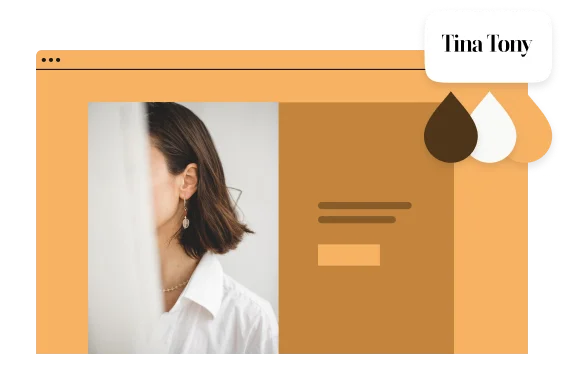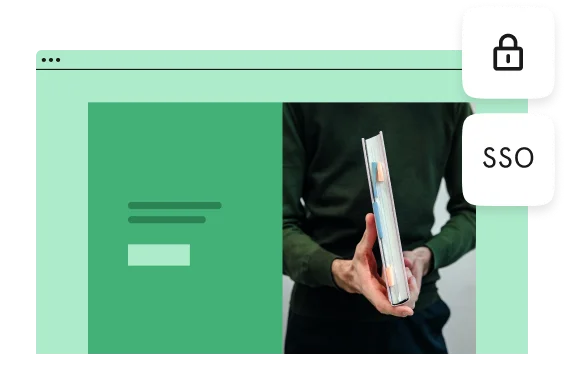Use the Logic Map to capture leads in Typeform
As a busy marketing pro, time is your most valuable resource. You don’t want to waste a second of your day—and you don’t think your clients and prospects should have to, either!
In this article, we’ll walk through creating a lead-generation form using Typeform’s intuitive form builder and interactive Logic branching. You’ll be able to collect all the information you need from new contacts, and thanks to Logic, your respondents will only see the questions that are relevant to them. It all comes together in a matter of minutes!
Oh, and great news: a Free Typeform account is all you need to create and publish this form. Let’s jump in!
1. From your Workspace, click the Create a new form button to open a new form.
2. You can choose to import your questions or create a form with AI. We’ll click Start from scratch for now. You can add custom design elements later on!
3. Now, you’ll see the Create panel. This is where you can add and design questions for your form.
You can also set up Logic from the Create panel. Logic is Typeform’s handy tool for guiding respondents through a form, using their previous answers to make sure they only see the questions that are most relevant to them.
We’ll get to Logic in just a bit. For now, click + Add content to see the full menu of question types.
Search for or select a question type to add it to your form.
You can add as many questions as you need! Check out the full list of question types to learn about your options. Here’s what we’ll use in this form:
- A Multiple Choice question asking which services interest the respondent
- A Short Text question to collect the respondent’s name
- An Email question asking for their email
- A Yes/No question asking if the respondent would like a quote on a current project
- Several follow-up questions for respondents working on a current project, like a Date question asking for their project due date, a Number question asking for their budget, and a Calendly question so that they can schedule a call. Later, we’ll set up Logic so that people without a current project won’t see these questions!
- A Yes/No question asking if the respondent wants to know anything else about your company
- A Long Text question so respondents who answer Yes can leave any questions or comments
We’ll also add an End Screen thanking respondents for filling out the form.
(Want hints on how to create better questions in a lead-generation form? Here’s a list of data-based tips!)
4. Once you’ve set up all of your questions, use the Design tab to add custom visual elements, like a background image, color palette, and favorite font, to your form.
If you’re on a Typeform Plus plan or above, you can even add your brand logo to the form.
5. Now, click Logic on the right-hand side of the Create panel to set up the rules that will decide which questions your respondents see, based on their answers.
In the center of the panel, you’ll see your Logic Map.
The Logic Map is a visual summary of the different question paths, or flows, that your respondents can follow when answering the form. Before you set up any Logic rules, your questions will appear in a straight line from left to right, according to the order they appear in your form. You can scroll or zoom out to see all of your questions.
6. Add your first rule. This rule will make sure that only respondents who are currently working on a project will see questions about project details. To create this rule, hover over the + icon on the right edge of the first Yes/No question (#4), asking whether respondents are working on a project.
Click the icon, then drag and drop it onto the second Yes/No question (#8), asking whether respondents have additional questions. This is the question that you want respondents who are not currently working on a project to see. A sidebar will then appear on the left of the Logic map.
7. Connecting these two questions creates a branch after question #4. Respondents will travel down one side of the branch, to question #5, or the other, to question #8, depending on their answer to question #4.
In the sidebar, you’ll set up the rules that send respondents to question #5 or question #8.
Use the dropdown menu to specify that respondents should go to question #8 only if they answer No to question #4.
If the respondents answer yes, they’ll see question #5 instead.
Now, click Save. Your rule is all set up!
Read more about setting up Logic to hide following questions here.
Any time you create a branching rule in Logic, branching icon(s) will appear on the paths you created. Click the icon to view the logical conditions you set up for branching.
You can then click Edit to edit the condition, or the trashcan icon to delete it
8. Set up a second branching rule after question #8, which asks respondents if they have any additional comments. Respondents who say Yes should go to a Long Text question, and respondents who say No should go to the form Ending.
Click the + icon on the right edge of question #8, and drag and drop it onto the Ending.
Create a condition to specify that respondents will go to the Ending only if they answer No to the Yes/No question
Click Save again to save your second rule.
9. Looking good! Did you know that you can add rules to your Logic map without dragging and dropping links between questions? To edit a question’s Logic, just click on the step for that question from the Logic Map.
You can then edit the question’s Logic from the left-hand side of the panel. Just click + Add rule to start creating a new rule.
For example, here we’ll add a rule to the Number question, which asks about project budget. Since you have a tight schedule and can’t take on every project, you might only want to offer a Calendly appointment to leads with a certain budget, while accepting other projects as you’re able.
We'll create a rule that if their budget is lower than 5000, they'll then go to question #8 and ask if they have any other questions for us. Respondents who answer with a budget over 5000, will move on to the next question that offers them the opportunity to book a Calendly appointment.
Since we added an Email question, we’ll still have their contact information, just in case!
Here’s what your Logic Map looks like after setting up the three rules shown here.
10. Remember that you can also use Logic to change the value of form scores, Hidden Fields, and variables based on question answers. Click on each feature name to learn more about how it works.
11. If you’ve created more than one rule for a question, each rule will appear as a white bar. For example, this question, from another form, has three rules.
Click on a bar to expand the rule. You can edit the rule, or click Delete this rule to remove it from your form.
You can also click Delete all rules at the bottom of the panel to remove all Logic for that step.
Once you’ve finished, click Save at the bottom of the panel.
To see a full summary of the Logic rules in your form, close the left-hand panel, and click Branching, segmentation and calculations, on the right side of the screen.
12. Awesome! You’ve become a pro at using the Logic Map. All that’s left is to click Publish.
Your form is live, and your lead-gen powers are off the charts. Go ahead, celebrate! If you have any questions later on about Logic in Typeform, these guides will be right there to lend a hand.



